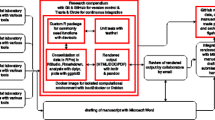Abstract
Reproducible research is the cornerstone of cumulative science and yet is one of the most serious crisis that we face today in all fields. This paper aims to describe the ongoing reproducible research crisis along with counter-arguments of whether it really is a crisis, suggest solutions to problems limiting reproducible research along with the tools to implement such solutions by covering the latest publications involving reproducible research.
Access this chapter
Tax calculation will be finalised at checkout
Purchases are for personal use only
Similar content being viewed by others
References
Popper, K.: The Logic of Scientific Discovery. Routledge, London (2005)
Peng, R.D.: Reproducible research in computational science. Science 334(6060), 1226–1227 (2011)
Barba, L.A.: Terminologies for reproducible research (2018). arXiv preprint:1802.03311
Fonseca Cacho, J.R., Taghva, K.: Reproducible research in document analysis and recognition. In: Information Technology-New Generations, pp. 389–395. Springer, Berlin (2018)
Leek, J.T., Peng, R.D.: Opinion: reproducible research can still be wrong: adopting a prevention approach. Proc. Natl. Acad. Sci. 112(6), 1645–1646 (2015)
Baker, M.: 1500 scientists lift the lid on reproducibility. Nature News 533(7604), 452 (2016)
Rampin, R., Chirigati, F., Steeves, V., Freire, J.: Reproserver: making reproducibility easier and less intensive (2018). arXiv preprint:1808.01406
Wickham, H., et al.: Tidy data. J. Stat. Softw. 59(10), 1–23 (2014)
Hutson, M.: Artificial intelligence faces reproducibility crisis. American Association for the Advancement of Science 359(6377), 725–726 (2018), https://doi.org/10.1126/science.359.6377.725, https://science.sciencemag.org/content/359/6377/725
Fonseca Cacho, J.R., Taghva, K., Alvarez, D.: Using the Google web 1t 5-gram corpus for OCR error correction. In 16th International Conference on Information Technology-New Generations (ITNG 2019), pp. 505–511. Springer, Berlin (2019)
Fonseca Cacho, J.R.: Improving OCR Post Processing with Machine Learning Tools. Ph.D. Dissertation, University of Nevada, Las Vegas (2019)
Fonseca Cacho, J.R., Taghva, K.: Aligning ground truth text with OCR degraded text. In: Intelligent Computing-Proceedings of the Computing Conference, pp. 815–833. Springer, Berlin (2019)
Nosek, B.A., Alter, G., Banks, G.C., Borsboom, D., Bowman, S.D., Breckler, S.J., Buck, S., Chambers, C.D., Chin, G., Christensen, G., et al.: Promoting an open research culture. Science 348(6242), 1422–1425 (2015)
Sayre, F., Riegelman, A.: The reproducibility crisis and academic libraries. Coll. Res. Libr. 79(1), 2 (2018)
Steeves, V.: Reproducibility librarianship. Collab. Librariansh. 9(2), 4 (2017)
Vines, T.H., Andrew, R.L., Bock, D.G., Franklin, M.T., Gilbert, K.J., Kane, N.C., Moore, J.-S., Moyers, B.T., Renaut, S., Rennison, D.J., et al.: Mandated data archiving greatly improves access to research data. FASEB J. 27(4), 1304–1308 (2013)
Claerbout, J.F., Karrenbach, M.: Electronic documents give reproducible research a new meaning. In: SEG Technical Program Expanded Abstracts 1992. Society of Exploration Geophysicists, pp. 601–604 (1992)
Ram, K.: Git can facilitate greater reproducibility and increased transparency in science. Source Code Biol. Med. 8(1), 7 (2013)
Patil, P., Peng, R.D., Leek, J.T.: A visual tool for defining reproducibility and replicability. Nat. Hum. Behav. 3(7), 650–652 (2019)
Hung, L.-H., Kristiyanto, D., Lee, S.B., Yeung, K.Y.: Guidock: using docker containers with a common graphics user interface to address the reproducibility of research. PloS One 11(4), e0152686 (2016)
Hosny, A., Vera-Licona, P., Laubenbacher, R., Favre, T.: AlgoRun, a Docker-based packaging system for platform-agnostic implemented algorithms. Bioinformatics 32(15), 2396–2398 (2016)
Dalle, O.: Olivier dalle. should simulation products use software engineering techniques or should they reuse products of software engineering?–part 1. SCS Model. Simul. Mag. 2(3), 122–132 (2011)
Voelkl, B., Würbel, H.: Reproducibility crisis: are we ignoring reaction norms? Trends Pharmacol. Sci. 37(7), 509–510 (2016)
Fanelli, D.: Opinion: is science really facing a reproducibility crisis, and do we need it to? Proc. Natl. Acad. Sci. 115(11), 2628–2631 (2018)
Fanelli, D.: How many scientists fabricate and falsify research? a systematic review and meta-analysis of survey data. PloS One 4(5), e5738 (2009)
Guthrie, M., Leblois, A., Garenne, A., Boraud, T.: Interaction between cognitive and motor cortico-basal ganglia loops during decision making: a computational study. J. Neurophysiol. 109 (12), 3025–3040 (2013)
Topalidou, M., Leblois, A., Boraud, T., Rougier, N.P.: A long journey into reproducible computational neuroscience. Front. Comput. Neurosci. 9(30) (2015)
Acknowledgements
Ben Cisneros for his contributions in helping run the survey and generating the graphics in this Publication.
Author information
Authors and Affiliations
Corresponding author
Editor information
Editors and Affiliations
Rights and permissions
Copyright information
© 2020 Springer Nature Switzerland AG
About this paper
Cite this paper
Cacho, J.R.F., Taghva, K. (2020). The State of Reproducible Research in Computer Science. In: Latifi, S. (eds) 17th International Conference on Information Technology–New Generations (ITNG 2020). Advances in Intelligent Systems and Computing, vol 1134. Springer, Cham. https://doi.org/10.1007/978-3-030-43020-7_68
Download citation
DOI: https://doi.org/10.1007/978-3-030-43020-7_68
Published:
Publisher Name: Springer, Cham
Print ISBN: 978-3-030-43019-1
Online ISBN: 978-3-030-43020-7
eBook Packages: EngineeringEngineering (R0)




